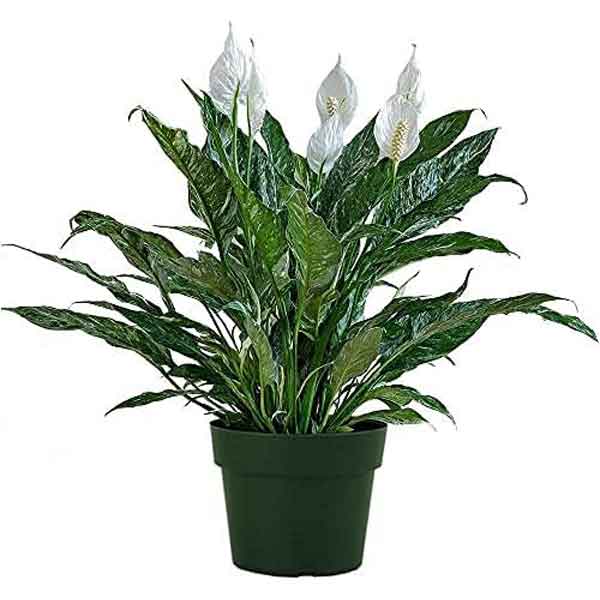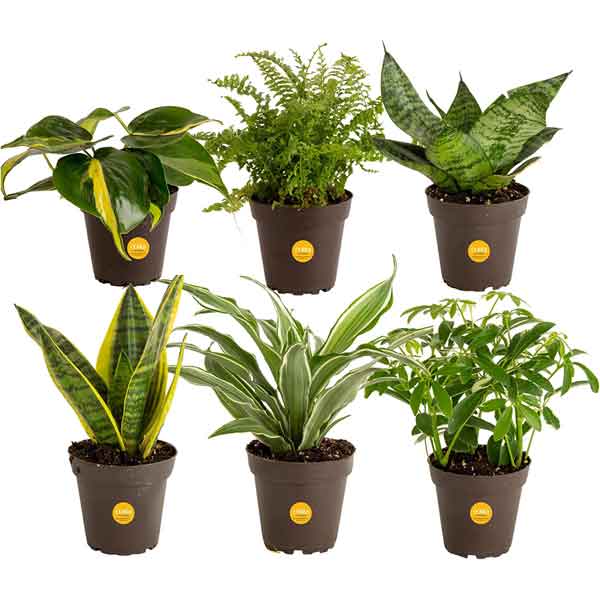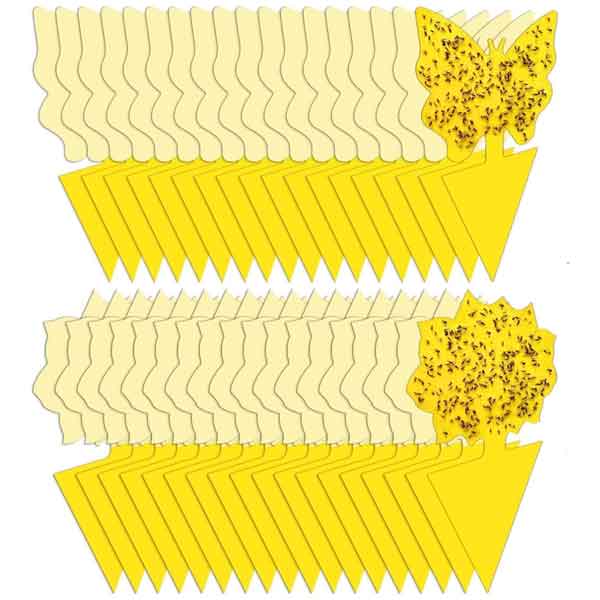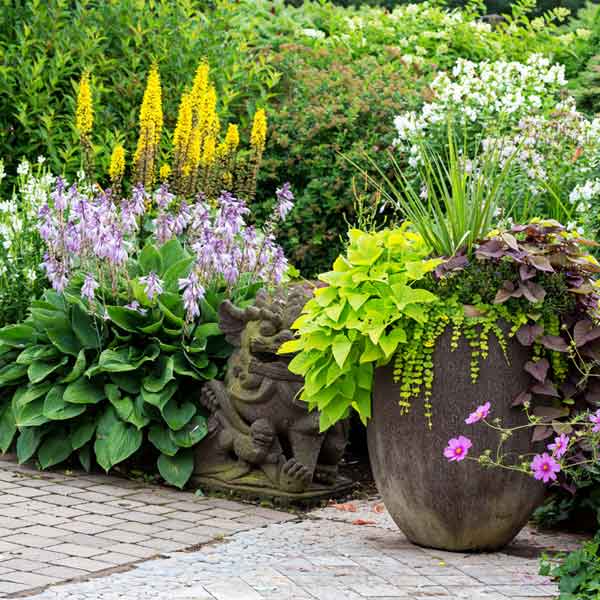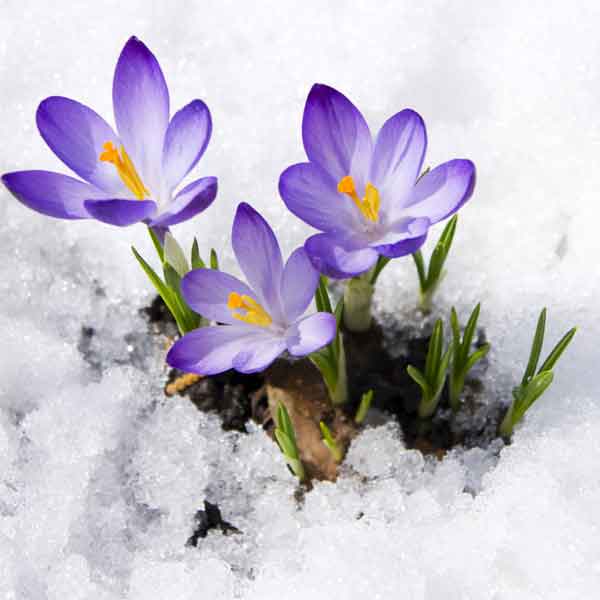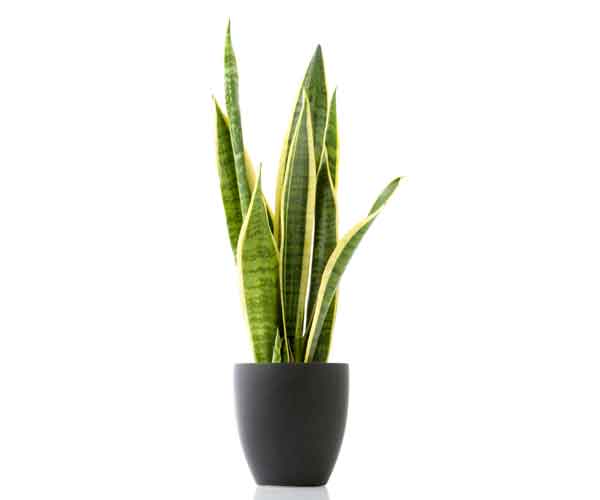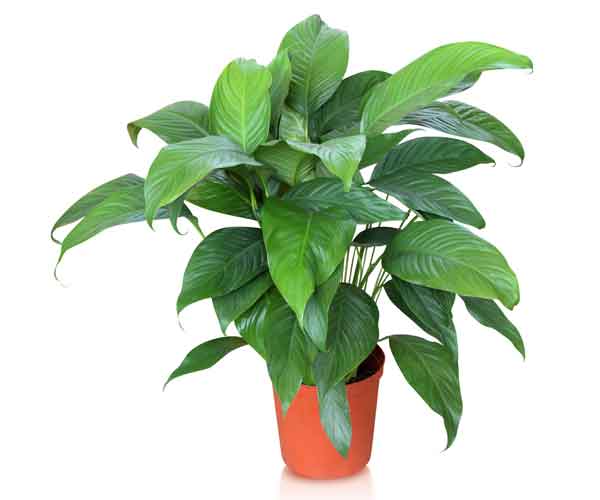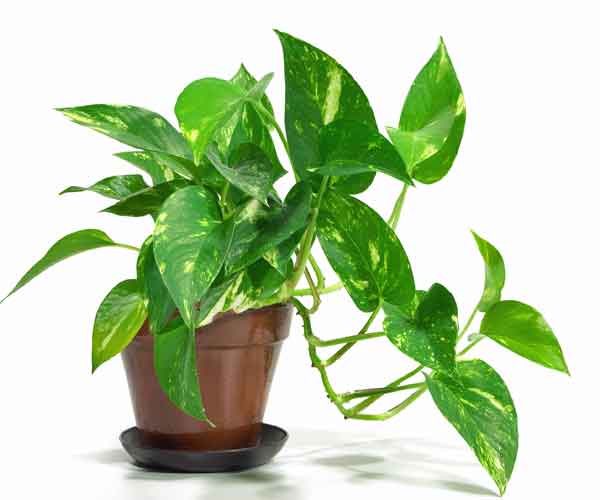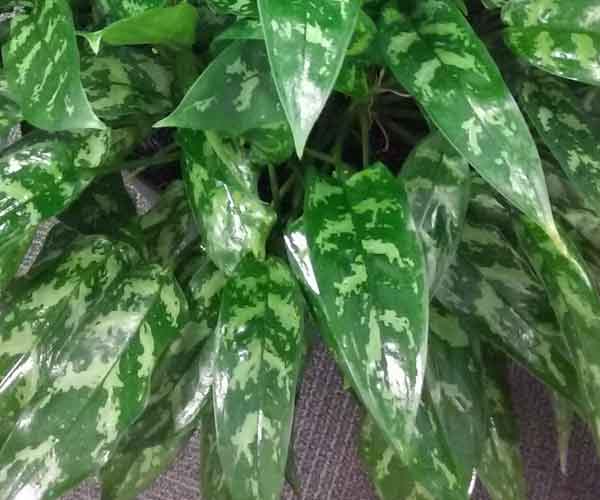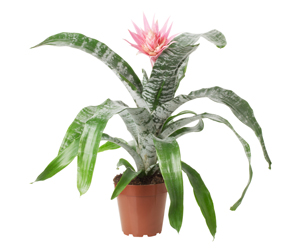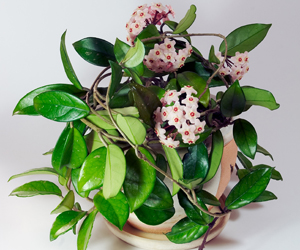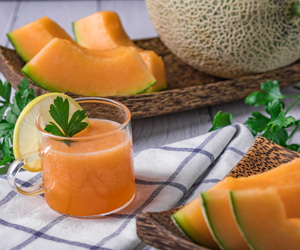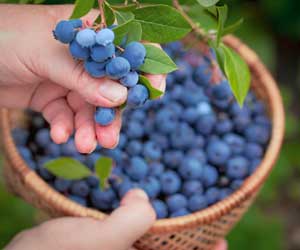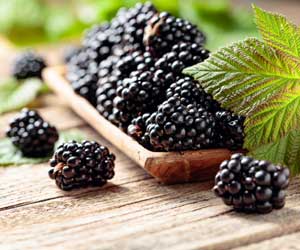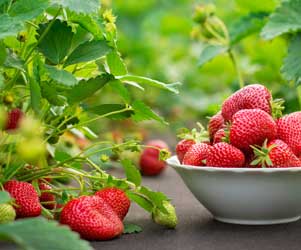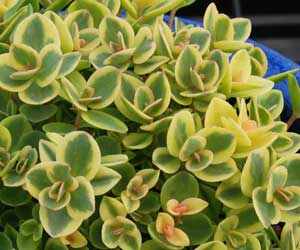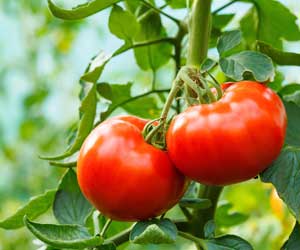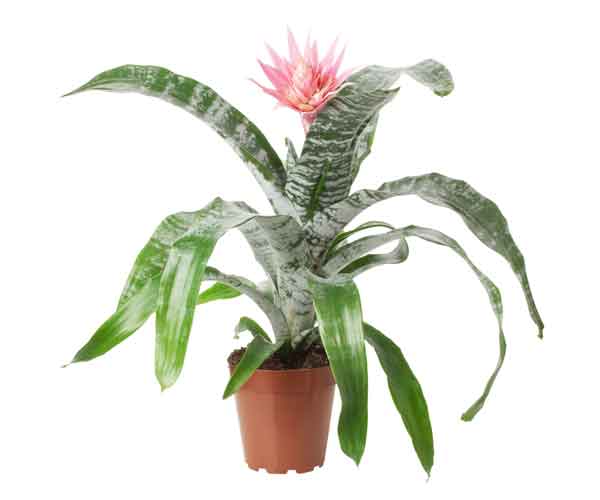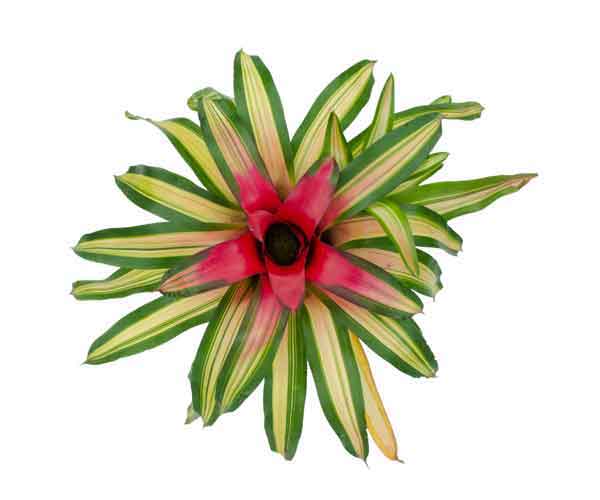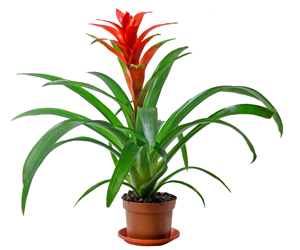Care of Hoya House Plant
Indoor Plants Flowers
Hoya carnosa is a vining plant that can be trailed over the edge of its pot or trained as a climbing plant. That makes the Hoya plant perfect for use as a table top plant, shelf plant, or use as a hanging plant near a window. Common name for the Hoya is Waxplant, Waxvine, or Waxflower. Hoya is an easy care, attractive indoor plant.

Flowering Hoya Plant
Hoya plants are a plant often used in interior landscapes. They are easy to grow and are often used in a mass planting or as a type of ground cover under other, larger plants. Hoya can be used as a table top plant, a hanging plant, and they can also be trained on a pole or trellis for use as a more upright plant.
Hoya is an easy care plant and will reward your good care with flowers if grown in bright light. Depending on the variety, flowers should appear in summer or fall. The waxy flowers are very fragrant. Hoya plants have thick leaves produced on self-branching stems. Hoya plants may have all green foliage or variegated foliage.
Hoya plants may attach themselves to wood, brick or your walls if they get a chance. Hoya is a good plant to use if you want a "climbing" plant. Train Hoya to climb on a trellis, moss stick, or wooden pole. Very often they are used in hanging containers and allowed to trail over the edge, which makes a great way to display a Hoya, especially when flowering.
Ads By Google
Hoya House Plant Care Question?
Hoya house plant care question? You can send a houseplant question but before you do, please read this information on watering your indoor houseplants, how to help keep your houseplant's root system healthy, lighting for your houseplants, and basic houseplant care. These are most important for your houseplant's health and this is some of the information I will refer you to if you send an email.
Working in the interior landscape industry, I get a lot of questions from people about their personal house plants and how to keep their own indoor house plants growing and healthy. That is why I started this website, to help others learn how to care for their indoor plants and flowers. So please read on!
⚘ How This Website Started ⚘
Hi Plant and Flower People!
I started this website in 2012 while helping my younger brother through a fight with terminal cancer. Between shopping, cleaning, cooking, laundry, doctor/hospital visits, and other tasks to help him, I taught myself HTML/CSS and other skills used in creating a website. My brother had a very successful stock photography website himself and his advice to me was to make a website about something you know.
I had left a job in the interior landscape industry in 2012 (I have worked in the interior landscape industry since 1986) to go across the country to help him out. So that became the subject of this website, indoor house plant and flower care.
It costs money for hosting service, domain fees, etc. to keep websites running. That is why I have third party ads/Amazon products and other affiliate links on webpages. Please use them if they are helpful to you as I earn commissions/ad revenue through them and they help pay costs for hosting, domain name, etc.
If you need some help with the general care of your indoor plants and flowers, read about basic houseplant care. You can also email houseplant care questions or requests for help identifying your mysterious indoor plant!
Please also consider supporting this website with a donation, if you can. Any help is appreciated. Hope you find some helpful information here. Thank you and read on Plant People!
Hoya House Plant Care
How to Water
From spring through summer, water Hoya plant soil has dried one quarter to half of its depth. Let dry almost completely fall through winter. There are a few things to consider before you decide to water any indoor house plant so please read the sections on watering your potted plants and lighting for your house plants for more information and for better plant health.
Hoya House Plant Care
Other Care Tips
Temperatures for Hoya plants should be kept between 50 - 85 degrees Fahrenheit. A bright, indirectly lit spot is ideal and is necessary for your Hoya house plant to produce flowers. Direct morning sun will not harm Hoya and will help with flowering. If your Hoya plant is variegated, the variegation may tend to fade in lower light. Feed lightly during active growth period and when flowering.
The Hoya plant produces flowers from the same spurs each year so do not prune these leafless vines off of your Hoya plant. Do not repot your Hoya plant unless it becomes root bound. Keeping your Hoya plant root bound helps promote flowering.
Mealy bugs are one of the most common insect problems that you will have with Hoya plant. Keep an eye out for this pest, especially when you first bring your new Hoya plant home. An oval shaped, somewhat flattened body and six legs distinguish this insect, although they can appear to have more legs because of their "antennae" and "tails". Here is a picture of mealybugs, if you are wondering what they look like. Mealybug is really the only pest problem that I have had with Hoya plant.
Home Garden Plants Flowers
Amazon Affiliate Links - May Earn Commission - Thanks!
A waxy, protective substance covers the body of adult mealybugs and egg sacs giving them a cottony appearance. Normally found in hidden areas, mealybugs can be hard to detect. Check the undersides of the leaves and in leaf axils. If your Hoya plant feels sticky, mealybugs may be the cause. They excrete a sticky substance called honeydew. The color of mealybugs will be white or gray.
You should isolate any new additions to your houseplant family for a week or two. This will give any disease or insects problems you may not have noticed time to appear so you can address it. And you will be protecting existing members of your house plant family from infection.
It is a good idea to quarantine any new additions to your indoor house plant family for a few weeks just to be sure there are not any insects that were not noticed at first. Wash down your new indoor house plant with a mixture of water and mild dish detergent. I like to add a few drops of Eucalyptus essential oil or Orange essential oil to my house plant cleaning solution.
Clean top and lower leaf and stem surfaces of your house plants, being careful not to saturate the soil. You can clean by hand or use a spray bottle to apply your house plant cleaning solution. I use a sponge moistened with my cleaning solution to gently wipe the top and lower leaf surfaces. Cleaning of your house plants should be a regular part of your house plant care. Never apply anything to your house plant's foliage until it has been watered and moved out of any direct sun. More house plant information follows.
Plants & Flowers
Easy House Plants
Home Gardening
Bromeliad House Plants
Social Media Pages
Plants Flowers
on Twitter
Tweets by plantcare2
PFI Facebook Page
Home and Garden
Houseplant Care Question?
Questions about your indoor house plants or plant care problems? You can send a house plant question, free of charge, no sign ups, registration or log in required!
Before you send a houseplant care question, please be sure to read this information on watering your indoor house plants, how to help keep your your indoor house plants root system healthy and lighting for your indoor house plants and flowers. These are most important for the health of your house plants and this is some of the information I will refer you to if you send an indoor house plant or flower care question.
You can post comments, find answers to plant care questions, or share some of your own plant wisdom on our plant care Facebook Page, Twitter page or visit my plant care blog. You can also find plant pictures, gardening ideas, and more at our plant and flower Pinterest page.
Thanks for visiting and come back soon as houseplant care information, pictures and more are being added all of the time. I hope that your indoor tropical house plants and all of your plants and flowers are happy, green and growing because that is why I started this indoor house plant and flower care website, PlantAndFlowerInfo.com.
Common House Plants Flowers Care Guide
Indoor Plants Pictures Names ⚘ Best Indoor Plants ⚘ Adiantum Fern Care ⚘ Aechmea Bromeliad Plant ⚘ Aglaonema Plant Care ⚘ Aglaonema Maria Plant Care ⚘ Aglaonema Silver Queen Plant Care ⚘ Aglaonema Silver Bay Plant Care ⚘ Anthurium Plants ⚘ Aphelandra Plant ⚘ Arboricola Plant Care ⚘ Aspidistra Plant Care ⚘ Asplenium Nidus Plant Care ⚘ Basic Houseplant Care ⚘ Birds Nest Ferns Plant Care ⚘ Boston Ferns Plant Care ⚘ Botanical Calendars ⚘ Bromeliad Plants ⚘ Build A Greenhouse ⚘ Buy Greenhouse ⚘ Buy House Plants ⚘ Cast Iron Plant ⚘ Chinese Evergreen Plant Care ⚘ Chlorophytum Plant Care ⚘ Codiaeum Houseplant Care ⚘ Corn Plant Care ⚘ Croton Plant Care ⚘ Devil's Ivy Plants & Care ⚘ Dieffenbachia Plant Care ⚘ Dracaena House Plant Care ⚘ Dracaena Janet Craig Plant Care ⚘ Dracaena Marginata Plant Care ⚘ Dracaena Warneckii Plant Care ⚘ Dumb Cane Plant ⚘ English Ivy Hedera ⚘ Ferns Plant Care ⚘ Ficus Trees Plants ⚘ Fittonia Plant Care ⚘ Flower Calendars ⚘ Heart Leaf Philodendron ⚘ Hedera English Ivy ⚘ How to Care for Marble Queen Pothos ⚘ Hoya House Plants ⚘ Lady Palm Plant ⚘ Lucky Bamboo House Plant Care ⚘ Maidenhair Ferns ⚘ Marble Queen Pothos ⚘ Marginata ⚘ Money Tree Plant Care ⚘ Mother In Law Tongue Plant Care ⚘ Names Pictures of Plants ⚘ Nephthytis ⚘ Norfolk Island Pine ⚘ Orchid Flowers ⚘ Palm Plants ⚘ Peace Lily Care ⚘ Philodendron "Brasil" Plant Care ⚘ Philodendron Cordatum ⚘ Philodendron Silver Care ⚘ Plant Calendars ⚘ Poinsettia Plant Flower Care ⚘ Pothos Plant Care ⚘ Rhapis Palm Plant Care ⚘ Sansevieria Plant Care ⚘ Schefflera Plant Care ⚘ Self-Watering Planters ⚘ Care of Silver Bay Plant ⚘ Snake Plant Care ⚘ Spathiphyllum Care ⚘ Spider Plant Care ⚘ Care of Syngonium Plant ⚘ Succulent Plant Care ⚘ Warneckii Plant Care ⚘ Weeping Fig Tree ⚘ Zebra Plant ⚘ ZZ Plant House Plant Care ⚘ Plant Links
Other Plant Flower Links
Best Indoor Plants ⚘ Indoor House Plants Pictures Names ⚘ Water Indoor Plants ⚘ Lighting Indoor Plants ⚘ Bonsai Plants ⚘ Common House Plants ⚘ Indoor Palm Plant Care ⚘ Orchids ⚘ Pets & Plants ⚘ Buy Tropical Orchids Orchid Care ⚘ Plant Flower Gifts ⚘ Buy Plants Flowers ⚘ House Plant Guide ⚘ How To Books ⚘ Flowers Plants Poster Prints ⚘ Orchid Art & Posters ⚘ Gardening Calendars ⚘ Greenhouse Books-Gardening
